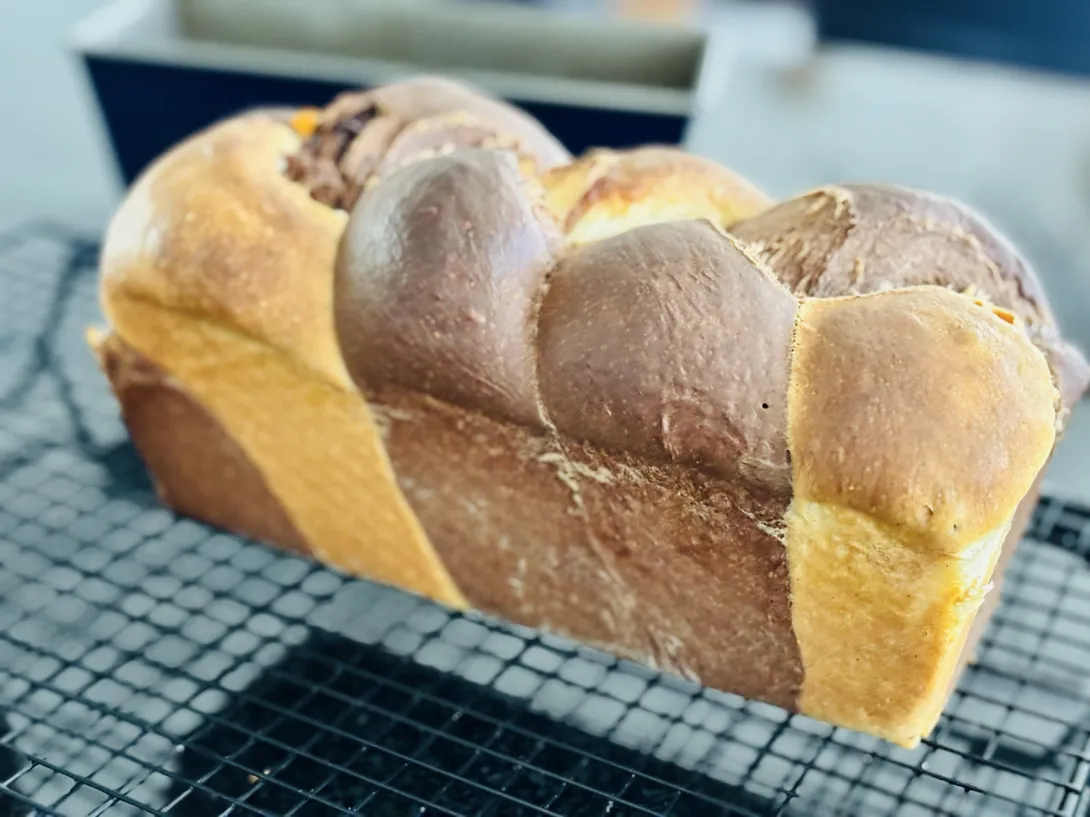
It’s been a while since I last made an (moderate) enriched dough. By chance, I came across a brioche recipe on brotokoll.com that I really liked: braided brioche with apricots, coconut water and chocolate: https://brotokoll.com/recipe-archiv/apri-coco-schoko-loco-twisted-pasta-madre-chocolate-apricot-brioche/?lang=en
Two small recipe adjustments:
- rehydrated diced dried apricots instead of caramelized apricots, because I didn’t have any fresh apricots.
- replaced half of the chocolate with white chocolate.
Unfortunately, the brioche was eaten up so quickly, I couldn’t take more photos. Very fluffy, soft, shreddy, with a beautiful structure. Apricots and chocolate are a wonderful combination. The cinnamon is a perfect match. I just couldn’t really taste the coconut flavor. But I imagine it would taste different without the coconut water.
- sparkfan's Blog
- Log in or register to post comments
Looks and sounds delicious, sparkfan!
I like intertwining of the colour separated doughs.
Great bake and thanks for the recipe.
Michael
Thank you, Michael. Every slice looks indeed totally different because of the coloured dough.
It looks so good, and unexpected. About those dried apricots, most of them have been treated with sulphur as an antimicrobial. Supposedly those aren't good for yeasted baked goods since microbes include yeast. Did you find some without sulphur, or did it not affect the dough development?
TomP
Thank you, TomP. Good topic. In many countries in Europe organic dried fruits are not treated with sulfites. It's forbidden if the producer wants to get the organic label. If sulfites are mentioned on the packaging, then sulfites have been used. If it's not mentioned then you can safely assume there are no sulfites.
Anyway, I'm not sure my surpermarket has organic dried apricots. I rinsed mine 2-3 times with hot water. Actually boiled the water, poured it over the apricots, stirred with a spoon, waited a few minutes and then repeated the procedure. This will probably not wash off all the sulfites, but it will reduce the amount of sulfites significantly. From what I've read the sulfites used in the food industry are water soluble.
Too much hot water for too long time might dilute the flavours.
If you use coconut milk you will get more flavor. The coconut water doesn’t add much when I’ve used it.
Actually I didn't have coconut water. The original recipe mentions to use half coconut milk, half water if you don't have coconut water. I realised later that the coconut milk probably also increased the amount of fat in the dough by 5% or so.
Next time maybe I'll try 100% coconut milk. Not sure, maybe I'll reduce in this case the amount of butter.
That looks amazing, sparkfan! Phenomenal work! I'm super obsessed with this post 😆
Jay
Thank you, Jay! For sure nothing compared with your flavours and bakes 😉
I'm pretty sure you could take the recipe to the next level 😉
I forgot to mention in the initial post that all the fermentation was at ~25ºC. I didn't cold (4-5ºC) final proof like in the original recipe for 12-16h. Cannot remember how long the bulk and the final proof took, but afair the bulk was a bit longer than the 2-2.5h in the original recipe.
I'm generally not a big fan of cold fermentation in the fridge. Nevertheless, I do it from time to time because of time constraints, but only with lean doughs.
With enriched doughs I try to avoid temperatures < 20ºC. I don't have a good scientific explanation. I just don't like when the fat stiffens so much at low temperatures that you almost cannot handle the dough anymore.
Also the fermentation speed slows dough anyway because of the high amounts of fat and sugar. Why should I slow it down even more with low temperatures.
I also didn't bake for 70-75min like in the original recipe. My brioche was roughly 40-50min in the oven. It was also a bit smaller and had a slightly different form factor than the original.